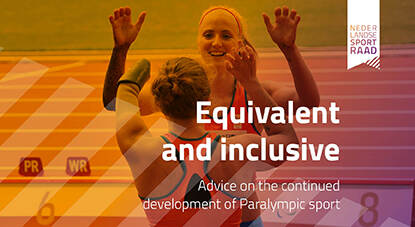International experts agree with Paralympic advice of the Netherlands Sports Council
International experts agree with the advice of the Netherlands Sports Council to strive for inclusion in Paralympic sport. However, they point out that long and thorough preparation is required before this can be achieved. At an international meeting on 31 May 2022, the Netherlands Sports Council spoke to them about the Equivalent and inclusive advice of the Council on the future of Paralympic sport.
The experts from Canada, Sweden, Norway and Belgium were briefed on the findings of the Netherlands Sports Council, the vision for the future of Paralympic sport (in the Netherlands and worldwide) and the recommendations. Representatives from NOC*NSF (Dutch Olympic Committee* Sports Federation) and Topsport Gelderland were present from the Netherlands. The meeting also served as feedback to international experts who had provided the Council with input for the advice in the autumn of 2021.

Equivalence requires time and focus
Those present at the meeting were generally complimentary about the advice, which they considered to be clear and thorough. However, they do believe that Paralympic sport first needs to emancipate itself still further before it can fully integrate. It is not only in sport that people with disabilities need to be seen as equal; steps still need to be taken in society as a whole. One participant noted that it is good to realise that not everyone will be satisfied with inclusion; emancipation remains a back-and-forth movement in the Paralympic international sports world and society as a whole.
Need for coordinated classification
The participants supported the advice of the Netherlands Sports Council to professionalise the classification of Paralympic athletes and to innovate the system. They also discussed the various interests and roles of the parties involved. For example, the international sports federations are responsible for classification in their own branch of sport. There is a risk that they will not coordinate sufficiently with each other and will continue to develop the classification system for their own sport independently. In addition, the link with scientific knowledge and innovation is not sufficiently ensured. One factor is that the International Paralympic Committee (IPC) has stopped funding research into the further development of classification. Those present argued that the federations, the IPC and the scientific community should coordinate sufficiently with one another. This could make Paralympic branches of sport more understandable and attractive, both to each other and to the public.
Input from rich and poor countries needed for international development
The participants regarded the Netherlands and a number of the other countries present as models for the further development of Paralympic sport. This requires cooperation and coordination. However, they warn that the perspective of the participants is very Western and oriented towards affluence. They regard it as a must to also include countries that are faced with different financial and social circumstances. In this context, football for people with an amputation was mentioned in a form that requires ‘only’ crutches and no expensive and innovative sports equipment. These kinds of sports would give many more countries and therefore athletes a chance to compete for the medals. The participants indicated that, for the further development of various Paralympic sports and the movement as a whole, a constructively critical discussion with the IPC and the international federations is necessary.